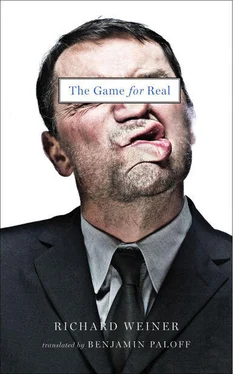Someone passed by. The late boarder jumped back, supposing that he was standing in the way, but so clumsily that he rammed right into the person he’d been dodging. That was Zinaida, carrying the soup. He swerved again, but just as ineptly; he inadvertently ended up right against the door. Zinaida reached for the handle.
“Here, hold that! Now wait a second!”
She opened the door, went in, and slammed the door shut with her foot.
He turned red, puffed up like a rooster. Fury was strangling him so much he had to open his mouth. But he didn’t get anything out of it, not a peep. For he beheld a kind of large open space that he had to get through alone, without help, at the mercy of malicious stares feasting on his dizziness, and he beheld that it could no longer be helped . He was so unconditionally walled up in that “I can’t not walk into the dining room” that he inadvertently recalled the first time he had to scramble out of the trenches. Now there wasn’t even an order or necessity or duty. But who says there isn’t duty? Only it’s the duty of Newton’s apple: to fall to earth. .
Yet when he reached for the handle the door opened again, and he was face-to-face with Zinaida.
“Excuse me, please!” she said, as if underscoring the sudden quiet that had broken out from the dining room in her wake. But she closed it behind her so slowly that he wondered, he wondered whether that closing wasn’t the mournful and ashamed retraction of the rude “Excuse me, please” a moment before, and when he looked up he noticed that Zinaida was not only not avoiding his eyes, but it was rather as though she had been waiting them out. They were standing there saying something to each other that neither of them understood. He, nevertheless, knowing that they were saying something to each other that he would never hear again, that no one would ever displace with anything, and that they could both deny later. Then she looked him over slowly from toe to head, and when she arrived at his eyes a simpleton’s smile took up residence on her lips.
“Oh, it’s you? Would it be a bother if you were to take your lunch in the kitchen? You’re the last, there are no more empty places.”
“That’s not true.”
She didn’t lower her eyes; on the contrary, she set them on him. (Someday, later on, he’ll tell himself, “she set her eyes on me still more Christianly.”)
“No, it’s not true. But there I’ll lay your table myself . Nice. And you’ll get more.”
She took him by the hand and led him, submissive. But at the threshold she stopped.
“For Christ’s sake, why didn’t you smack him one?”
It sounded different from before. No longer just contemptuous; helpless.
“Is there a beautification society in town?”
“There’s a beautification society in town.”
“Do they keep apartment listings?”
“They do keep apartment listings.”
“Is it possible to hire transport from town?”
“It can be arranged. — Do you want to go on an excursion, sir?”
“Draw up my bill.”
“Are you leaving us, sir?”
“Could you telephone for my transport?”
“Are you not pleased with us, sir?”
“Telephone for transport.”
“It could be here in an hour.”
“My bill.”
“I agree with you, sir. When something like that has happened. .”
The innkeeper was preparing to burn him with a look, but all he managed was the word “ pardon! ”; he saddled himself upon it and rode off. — — The luggage was already on the driver’s box. It was well-situated. The innkeeper knew it was well-situated, he had been all the more eager in arranging it.
He who was in the carriage at length discovered the coveted sensation that he had reserved for noon at his own table, and which had ultimately stood him up. Now he was sitting in his own carriage. He leaned out:
“You should be ashamed. . If I were to sue. . If there weren’t three of them, and they didn’t have a car. .”
The innkeeper lowered his head; with his right hand he was sort of crumbling something to the hens. . Suddenly he stepped back, two paces, three, four; he stood and lifted his eyes; they were empty.
“Excuse me?” he said, and his sunken eyes were again made whole; he gulped:
“So you think it was only because they have a car. .?” Even though his chin was quivering with terror, he plucked up his courage and let him have it with a look. But it was only for a second, as a test, but once the second had elapsed the innkeeper knew enough that he started to dare to open his mouth; the fear was God knows where.
“Right, but now I remember I forgot to charge you for the phone call.” –
The carriage got going. The innkeeper was watching it leave and took two steps away; suddenly, he squatted down and slapped his thighs:
“And nothing for the servants either? You beggar!”
A narrow road beneath a wooded slope, along a little river, which it clung to anxiously. Groves, small bridges, abandoned mills, pools, the quiet of old settlements. Everything steady, more or less. He paid it no mind. — They drove past a sumptuous, operetta-ish tavern. He’d asked about the prices three days before.
“For a lousy ten francs’ difference. .”
He waved his hand: A shopkeeper shooing away the memory of the store that seemed like such a great idea, and that he’s paid off at last. — He waved his hand. Glumly. Just like that, glumly, and he sank into a corner. As though he were chewing something over. His teeth started to hurt; he’d come to loathe them. And having come to loathe them, he arrived at a sort of path set down as though with a ruler, it went straight. . When he got there, he was so amazed that his eyes popped out: he had arrived upon an indigestable revulsion.
They drove into town. He said to himself: “Traitor”; and he said to himself: “Where did that association come from?” They stopped in front of the office of the beautification society.
The street was called “Bel-Air.” In the walled gardens, the jasmine and lilac had long since passed their bloom, and the tannery, having no one to quarrel with, added its own stench as well. — One entered the room through a glass door, straight off the street. Besides that, there were two windows; it was gloomy nonetheless, with a peculiarly defiant darkness. After he had unpacked, arranged, and hung, the time could be counted and calculated down to the minute — he knew he could count on it — when he would at last have faith in this room: today, at this very second, when he would pay the landlady what he still owed, when he would pack his things back up and hear the idling engine of the cab that had stopped.
“Have you come far?” the lady asked.
He didn’t catch it, without having not caught it. — He shoved his hands into his pockets, strained, crowded right up to her, and with his chin resting imposingly on his chest said, flirting mischievously with the precise certainty that he was funny, “I advise you to keep everything locked away from me.”
“Sorry?”
“I’m thinking that since you’re checking me out.”
“You must be joking,” she said, stepping back.
“I must be. . Where am I coming from? From the dale. From Benedictine Mill. Should you wish to ask. . It seems I stole a bracelet there. Four hundred thousand.”
When he returned that evening, he noticed, unlocking the door, three whispering crones. They’d jumped into a blind alley around the corner (the house stood on its own). One of them peeked back out a moment later. But because he was still looking in their direction, she quickly jerked away.
Rue Bel-Air was one of the three that led from the square toward abrupt ramparts. The square boasted the aggressive health of a beet farmer, and it had been a town. In the middle, on a brick terrace, six rows of chestnuts. They called it “lover’s lane.” In the day, it was strewn with greasy pieces of paper, at night a pitchy darkness. A statue of Marshal Vauban stood on a plinth at the head of this vice, excusing it. Yet he had a dirty conscience. Where Rue Bel-Air suddenly broke off there stood a Romanesque church. Its tympanum was the sole thing of consequence to have happened in the shameless town in eight centuries. The estimable family jewel on the goiter of a trifling and miserly governess. What there was beyond the church was connected to the town solely by its not having a leg to stand on. Oh, to break up with the parvenu , to disperse among the forests of the Morvan, to vanish beneath the ivy! The gloriettes, pavilions, terraces, the mascarons; the mallow, begonias, dahlias, and wild grape; the red cedars, sycamores, and fruit trees: this cascade of thickened southern beauty, strayed north and by the north wantonly mistreated. To repel down the cliff, to float down the little river that flowed around it, and “ planter là ” a deceitful town that exploited it as a decoy. But the courage had become paralyzed.
Читать дальше












